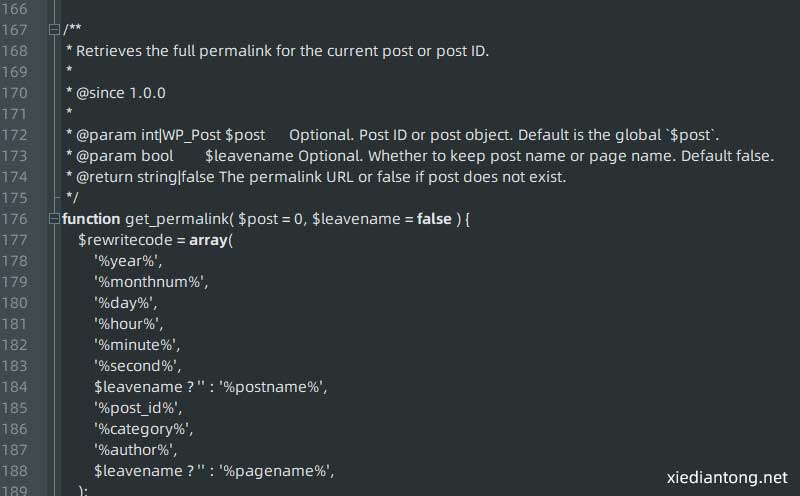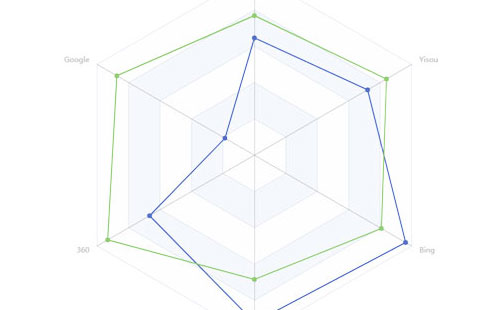之前文档中我们有介绍,使用the_permalink()来显示文档链接URL;如果我们只知道文档的ID,需要使用get_permalink()标签来获取文档链接URL,以下方法$post_ID是您要调用文档的ID,使用方法如下:
<?php echo get_permalink($post_ID); ?>
当然,如果您是在当前文档中,可以直接使用the_permalink();来读取当前文档链接,例如:
<?php the_permalink(); ?>

get_permalink()位于 /wp-includes/link-template.php 176行[5.9.3版本]
/**
* Retrieves the full permalink for the current post or post ID.
*
* @since 1.0.0
*
* @param int|WP_Post $post Optional. Post ID or post object. Default is the global `$post`.
* @param bool $leavename Optional. Whether to keep post name or page name. Default false.
* @return string|false The permalink URL or false if post does not exist.
*/
function get_permalink( $post = 0, $leavename = false ) {$rewritecode = array(
'%year%',
'%monthnum%',
'%day%',
'%hour%',
'%minute%',
'%second%',
$leavename ? '' : '%postname%',
'%post_id%',
'%category%',
'%author%',
$leavename ? '' : '%pagename%',
);
if ( is_object( $post ) && isset( $post->filter ) && 'sample' === $post->filter ) {$sample = true;
} else {$post = get_post( $post );
$sample = false;
}
if ( empty( $post->ID ) ) {return false;
}
if ( 'page' === $post->post_type ) {return get_page_link( $post, $leavename, $sample );
} elseif ( 'attachment' === $post->post_type ) {return get_attachment_link( $post, $leavename );
} elseif ( in_array( $post->post_type, get_post_types( array( '_builtin' => false ) ), true ) ) {return get_post_permalink( $post, $leavename, $sample );
}
$permalink = get_option( 'permalink_structure' );
/**
* Filters the permalink structure for a post before token replacement occurs.
*
* Only applies to posts with post_type of 'post'.
*
* @since 3.0.0
*
* @param string $permalink The site's permalink structure.
* @param WP_Post $post The post in question.
* @param bool $leavename Whether to keep the post name.
*/
$permalink = apply_filters( 'pre_post_link', $permalink, $post, $leavename );
if (
$permalink &&
! wp_force_plain_post_permalink( $post )
) {$category = '';
if ( strpos( $permalink, '%category%' ) !== false ) {$cats = get_the_category( $post->ID );
if ( $cats ) {$cats = wp_list_sort(
$cats,
array(
'term_id' => 'ASC',
)
);
/**
* Filters the category that gets used in the %category% permalink token.
*
* @since 3.5.0
*
* @param WP_Term $cat The category to use in the permalink.
* @param array $cats Array of all categories (WP_Term objects) associated with the post.
* @param WP_Post $post The post in question.
*/
$category_object = apply_filters( 'post_link_category', $cats[0], $cats, $post );
$category_object = get_term( $category_object, 'category' );
$category = $category_object->slug;
if ( $category_object->parent ) {$category = get_category_parents( $category_object->parent, false, '/', true ) . $category;
}
}
// Show default category in permalinks,
// without having to assign it explicitly.
if ( empty( $category ) ) {$default_category = get_term( get_option( 'default_category' ), 'category' );
if ( $default_category && ! is_wp_error( $default_category ) ) {$category = $default_category->slug;
}
}
}
$author = '';
if ( strpos( $permalink, '%author%' ) !== false ) {$authordata = get_userdata( $post->post_author );
$author = $authordata->user_nicename;
}
// This is not an API call because the permalink is based on the stored post_date value,
// which should be parsed as local time regardless of the default PHP timezone.
$date = explode( ' ', str_replace( array( '-', ':' ), ' ', $post->post_date ) );
$rewritereplace = array(
$date[0],
$date[1],
$date[2],
$date[3],
$date[4],
$date[5],
$post->post_name,
$post->ID,
$category,
$author,
$post->post_name,
);
$permalink = home_url( str_replace( $rewritecode, $rewritereplace, $permalink ) );
$permalink = user_trailingslashit( $permalink, 'single' );
} else { // If they're not using the fancy permalink option.$permalink = home_url( '?p=' . $post->ID );
}
/**
* Filters the permalink for a post.
*
* Only applies to posts with post_type of 'post'.
*
* @since 1.5.0
*
* @param string $permalink The post's permalink.
* @param WP_Post $post The post in question.
* @param bool $leavename Whether to keep the post name.
*/
return apply_filters( 'post_link', $permalink, $post, $leavename );
}

